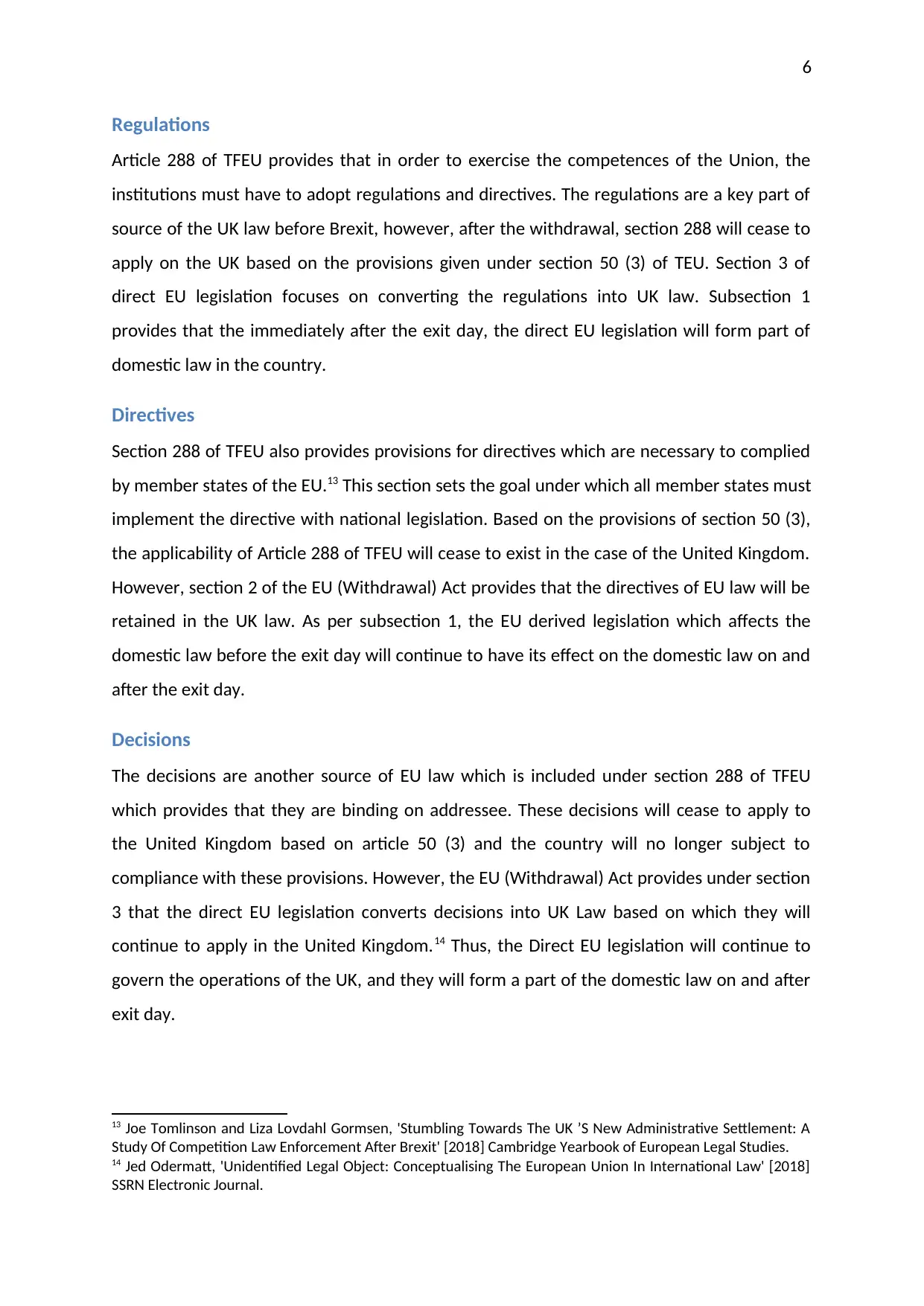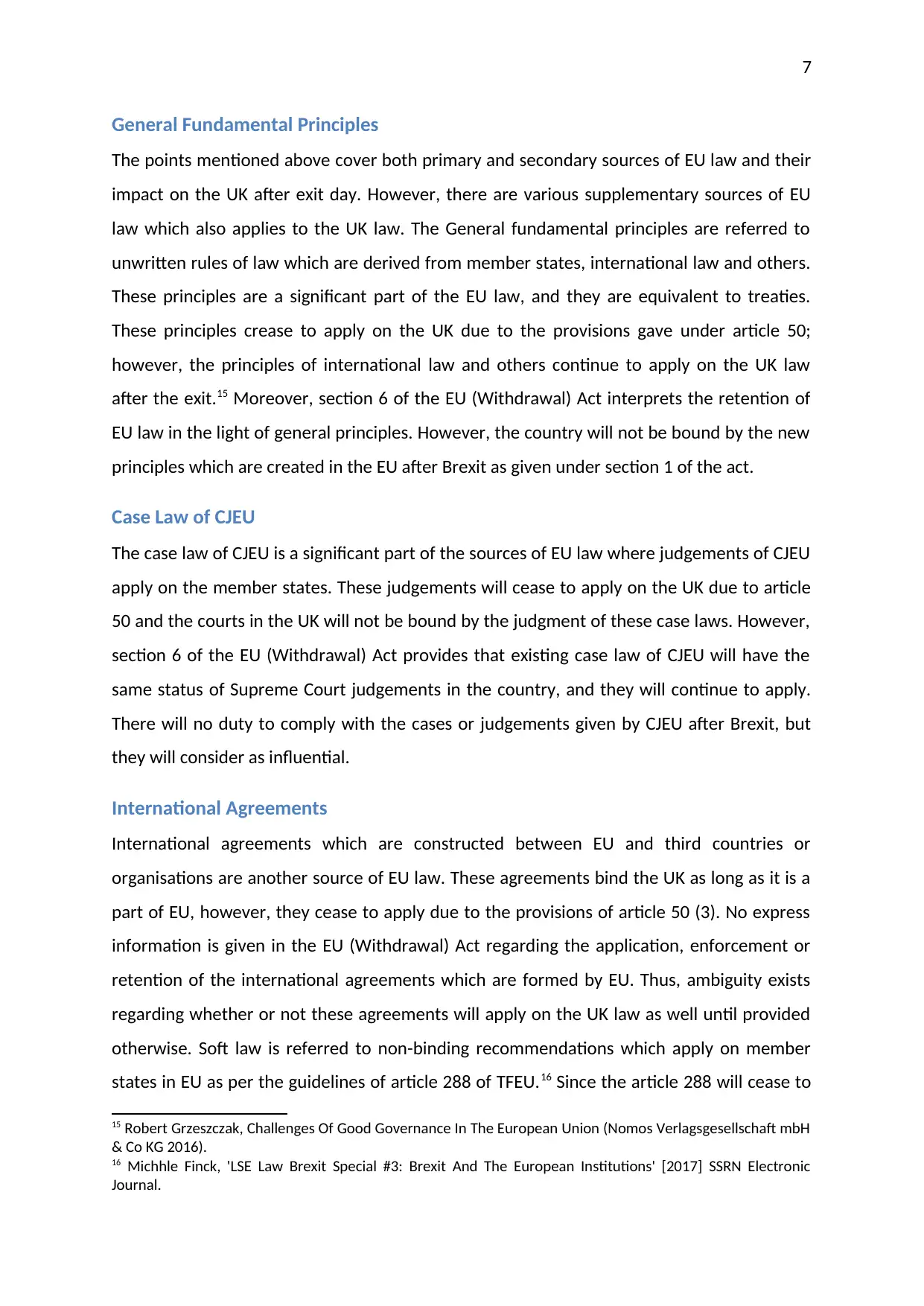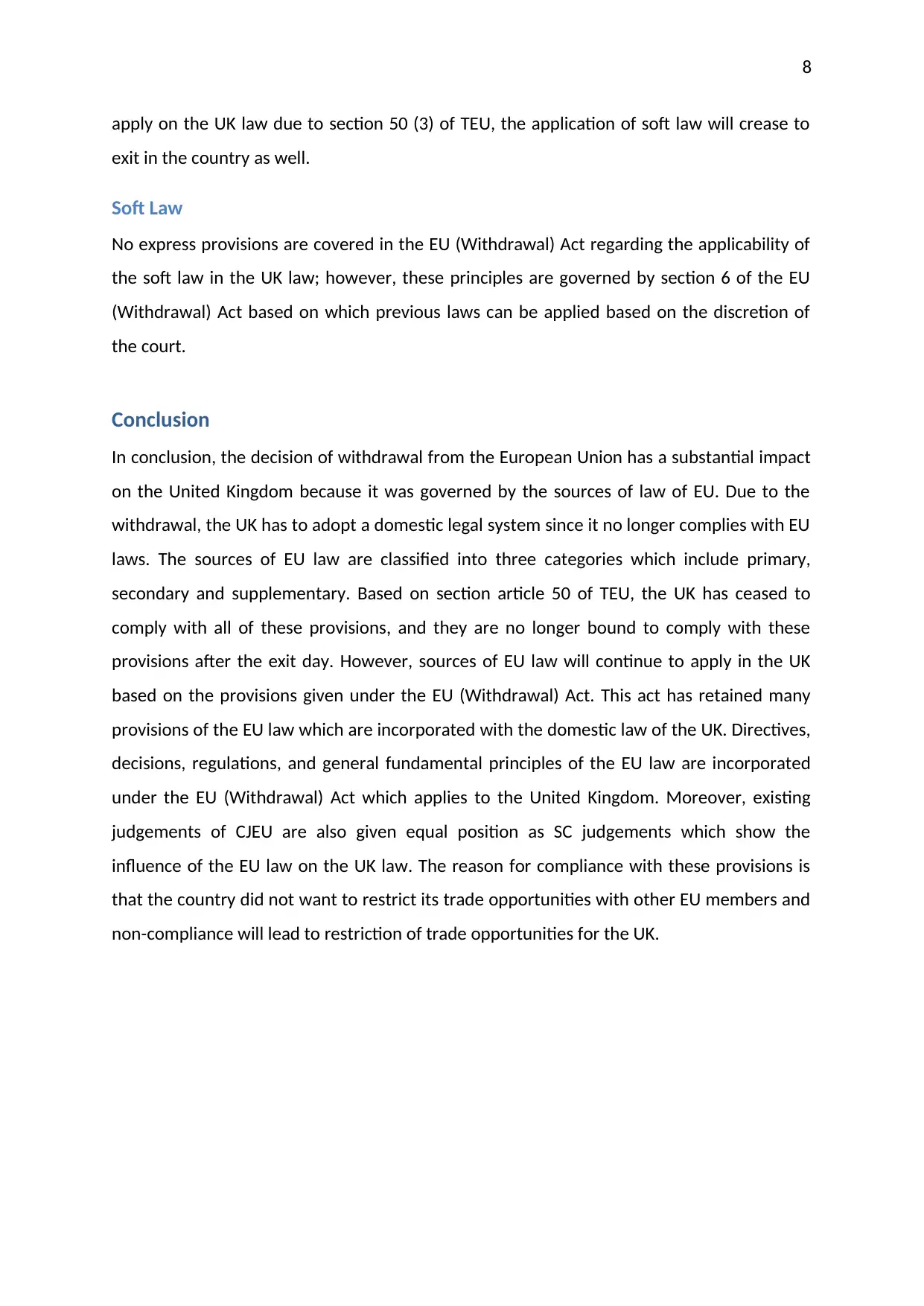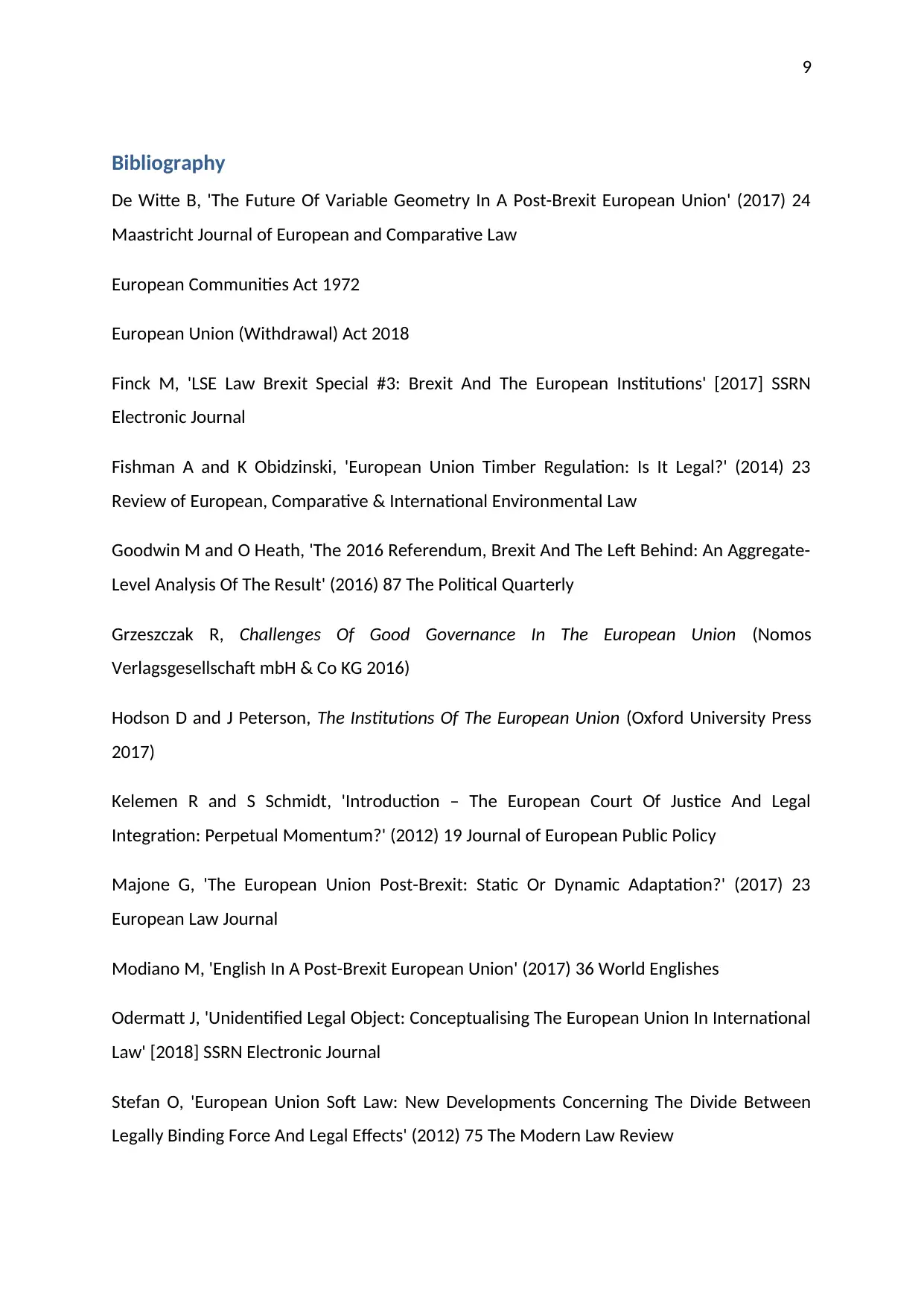Sources and Impact of EU Law on UK after Brexit
VerifiedAdded on 2023/06/03
|11
|3914
|490
AI Summary
This essay evaluates the extent up to which the sources of EU law apply in the UK after the withdrawal. It analyses all sources of EU law and considers various factors such as supremacy, enforcement, direct effect, indirect effect and state liability. It also discusses the impact of Brexit on EU law and analyses the proposed European Union (Withdrawal Agreement) Bill.
Contribute Materials
Your contribution can guide someone’s learning journey. Share your
documents today.

0
EU Law
EU Law
Secure Best Marks with AI Grader
Need help grading? Try our AI Grader for instant feedback on your assignments.

1
Introduction
The European Union (Withdrawal) Act 20181 is the legislation which has been enacted by
the Parliament of the United Kingdom. The introduction of this act resulted in repealing the
European Communities Act 1972,2 and it is formed based on the negotiation between HM
Government and the European Union. After withdrawing of Britain from the European
Union (EU), Brexit, the laws which govern the nation has changed. The vote for Brexit was
made on 23rd June 2016, and the referendum was advisory rather than mandatory, and this
decision did not have immediate legal consequences. This essay will focus on evaluating the
extent up to which the sources of EU law which include both existing and future laws apply
in the UK after the withdrawal. This essay will analyse all sources of EU law and consider
various factors such as supremacy, enforcement, direct effect, indirect effect and state
liability. The information regarding withdrawal of Britain from the EU will be discussed in the
essay along with information on the history of the EU or the institutions. In order to
evaluate this topic, the proposed European Union (Withdrawal Agreement) Bill will be
analysed in the essay.
Sources of EU Law
European Union is referred to an organisation which is formed by the combination of some
European countries that cater to common factors including military, economic and political
that affects the member states. The EU law was initially referred as European Community
Law; it is a body which comprises treaties, judgements and laws which act together along
with other legislation of member states.3 This law is highly respected by member states, and
in case a conflict arise based on political, economic or human rights factors, then the EU law
is given priority than compared to the national laws of member states. The sources of EU
law are categorised into three types which include primary law, secondary law and
supplementary law.
1 European Union (Withdrawal) Act 2018
2 European Communities Act 1972
3 Matthew J. Goodwin and Oliver Heath, 'The 2016 Referendum, Brexit And The Left Behind: An Aggregate-
Level Analysis Of The Result' (2016) 87 The Political Quarterly.
Introduction
The European Union (Withdrawal) Act 20181 is the legislation which has been enacted by
the Parliament of the United Kingdom. The introduction of this act resulted in repealing the
European Communities Act 1972,2 and it is formed based on the negotiation between HM
Government and the European Union. After withdrawing of Britain from the European
Union (EU), Brexit, the laws which govern the nation has changed. The vote for Brexit was
made on 23rd June 2016, and the referendum was advisory rather than mandatory, and this
decision did not have immediate legal consequences. This essay will focus on evaluating the
extent up to which the sources of EU law which include both existing and future laws apply
in the UK after the withdrawal. This essay will analyse all sources of EU law and consider
various factors such as supremacy, enforcement, direct effect, indirect effect and state
liability. The information regarding withdrawal of Britain from the EU will be discussed in the
essay along with information on the history of the EU or the institutions. In order to
evaluate this topic, the proposed European Union (Withdrawal Agreement) Bill will be
analysed in the essay.
Sources of EU Law
European Union is referred to an organisation which is formed by the combination of some
European countries that cater to common factors including military, economic and political
that affects the member states. The EU law was initially referred as European Community
Law; it is a body which comprises treaties, judgements and laws which act together along
with other legislation of member states.3 This law is highly respected by member states, and
in case a conflict arise based on political, economic or human rights factors, then the EU law
is given priority than compared to the national laws of member states. The sources of EU
law are categorised into three types which include primary law, secondary law and
supplementary law.
1 European Union (Withdrawal) Act 2018
2 European Communities Act 1972
3 Matthew J. Goodwin and Oliver Heath, 'The 2016 Referendum, Brexit And The Left Behind: An Aggregate-
Level Analysis Of The Result' (2016) 87 The Political Quarterly.

2
Primary Law
Firstly, the primary law in EU comes from treaties which form the European Union. These
treaties were adopted by the member states to establish the European communicates and
the union. The member states continue to adopt these treaties in order to expand the EU
territories and amend the functions of EU law and constitution. These treaties must be
agreed by all member states. The founder treaty of the European Union was the Paris treaty
which was signed in 1951 and the Rome treaty of 1957.4 Based on these treaties, the
member states completed adequate negotiations, and they agreed to lay down various
guidelines in the form of treaties which are subject to rectification which can be made by
the member states and parliaments. Various guidelines and provisions are given under
these treaties. For instance, they define the role of each member state and institutions
which are found in the EU. These treaties also provide provisions for bodies which are
involved in the decision making process and the legislation, executive and other practices
which result in constituting the community law and the appropriate implementation of the
law. The protocols given in these treaties are binding whereas the declarations are non-
binding on member states. The treaties are directly applicable to the operations of member
states which mean that once a treaty is formed or incorporated, then there is no need for
implementation of individual articles.5 Article 48 of the Treaty of European Union (TEU)
provides provisions for revisions made in those treaties. The primary law of EU also include
the amending EU treaties in which changes are made by the government and member
states. The protocols annexed to the founding treaties along with the amending treaties are
a part of the primary sources of law of European Union as well. The treaties which are
formed on accession or consent of new countries to the EU are also a part of the primary
source of EU law.
Secondary Law
The secondary law of EU is constituted of acts and agreements which are signed by member
countries which are a part of the European Union in order to govern their activity to achieve
the pre-determined goal set by the parties. The secondary law of EU comprises agreements
and unilateral acts. The unilateral acts given in the secondary law are further classified into
4 Dermot Hodson and John Peterson, The Institutions Of The European Union (Oxford University Press 2017).
5 Akiva Fishman and Krystof Obidzinski, 'European Union Timber Regulation: Is It Legal?' (2014) 23 Review of
European, Comparative & International Environmental Law.
Primary Law
Firstly, the primary law in EU comes from treaties which form the European Union. These
treaties were adopted by the member states to establish the European communicates and
the union. The member states continue to adopt these treaties in order to expand the EU
territories and amend the functions of EU law and constitution. These treaties must be
agreed by all member states. The founder treaty of the European Union was the Paris treaty
which was signed in 1951 and the Rome treaty of 1957.4 Based on these treaties, the
member states completed adequate negotiations, and they agreed to lay down various
guidelines in the form of treaties which are subject to rectification which can be made by
the member states and parliaments. Various guidelines and provisions are given under
these treaties. For instance, they define the role of each member state and institutions
which are found in the EU. These treaties also provide provisions for bodies which are
involved in the decision making process and the legislation, executive and other practices
which result in constituting the community law and the appropriate implementation of the
law. The protocols given in these treaties are binding whereas the declarations are non-
binding on member states. The treaties are directly applicable to the operations of member
states which mean that once a treaty is formed or incorporated, then there is no need for
implementation of individual articles.5 Article 48 of the Treaty of European Union (TEU)
provides provisions for revisions made in those treaties. The primary law of EU also include
the amending EU treaties in which changes are made by the government and member
states. The protocols annexed to the founding treaties along with the amending treaties are
a part of the primary sources of law of European Union as well. The treaties which are
formed on accession or consent of new countries to the EU are also a part of the primary
source of EU law.
Secondary Law
The secondary law of EU is constituted of acts and agreements which are signed by member
countries which are a part of the European Union in order to govern their activity to achieve
the pre-determined goal set by the parties. The secondary law of EU comprises agreements
and unilateral acts. The unilateral acts given in the secondary law are further classified into
4 Dermot Hodson and John Peterson, The Institutions Of The European Union (Oxford University Press 2017).
5 Akiva Fishman and Krystof Obidzinski, 'European Union Timber Regulation: Is It Legal?' (2014) 23 Review of
European, Comparative & International Environmental Law.

3
two categorised which include those are listed in Article 288 of the Treaty on the
Functioning of the Union (TFEU).6 These include regulations, directives, decisions, opinions
and recommendations. Moreover, there are various unilateral acts which are also included
in secondary law but not listed in Article 288 of TFEU which include ‘atypical’ acts such as
white and green papers, communication and recommendations. Moreover, conventions and
agreements are a part of the secondary law of EU as well which include international
agreement, which is signed by the EU and another country or an outside organisation.
Furthermore, agreement which is formed between EU countries and ‘interinstitutional’
agreement, which are the agreements between the EU institutes, is a part of the secondary
law as well.
Supplementary Law
The law category of sources of EU law is the supplementary law. The supplementary law is
referred to the general principles of the law which are not written, and they are a part of
case laws. These principles are not specifically mentioned in the treaties formed between
the member states. This category includes various factors such as case laws of the Court of
Justice of the EU (CJEU). 7 Moreover, this category includes international laws which are
often considered as a source of inspiration for the CJEU when they are entertaining a case
law. In these cases, factors such as international written law, custom and usage are cited by
the CJEU. Furthermore, the general principles of law which are considered as unwritten
sources of law which are developed by the case-law of the CJEU are a part of the
supplementary sources of EU law. These laws enable the CJEU to implement rules in
different areas which are not covered under the treaties formed between member states.
Brexit (Withdrawal from the EU)
Brexit is the shorthand way of saying the leaving of UK from the EU. The decision for leading
the EU was taken on 23 June 2016 in which everyone who is of voting age can take part
decided that Britain should leave the European Union and the leave won by 51.9 percent to
48.1 percent votes. Withdraw of Britain from the EU is scheduled for Friday, 29th March
2019 and this time can be exceeded if all the EU members agree for the same. The decision
6 Stephen Weatherill, Cases And Materials On EU Law (Oxford University Press 2014).
7 R. Daniel Kelemen and Susanne K. Schmidt, 'Introduction – The European Court Of Justice And Legal
Integration: Perpetual Momentum?' (2012) 19 Journal of European Public Policy.
two categorised which include those are listed in Article 288 of the Treaty on the
Functioning of the Union (TFEU).6 These include regulations, directives, decisions, opinions
and recommendations. Moreover, there are various unilateral acts which are also included
in secondary law but not listed in Article 288 of TFEU which include ‘atypical’ acts such as
white and green papers, communication and recommendations. Moreover, conventions and
agreements are a part of the secondary law of EU as well which include international
agreement, which is signed by the EU and another country or an outside organisation.
Furthermore, agreement which is formed between EU countries and ‘interinstitutional’
agreement, which are the agreements between the EU institutes, is a part of the secondary
law as well.
Supplementary Law
The law category of sources of EU law is the supplementary law. The supplementary law is
referred to the general principles of the law which are not written, and they are a part of
case laws. These principles are not specifically mentioned in the treaties formed between
the member states. This category includes various factors such as case laws of the Court of
Justice of the EU (CJEU). 7 Moreover, this category includes international laws which are
often considered as a source of inspiration for the CJEU when they are entertaining a case
law. In these cases, factors such as international written law, custom and usage are cited by
the CJEU. Furthermore, the general principles of law which are considered as unwritten
sources of law which are developed by the case-law of the CJEU are a part of the
supplementary sources of EU law. These laws enable the CJEU to implement rules in
different areas which are not covered under the treaties formed between member states.
Brexit (Withdrawal from the EU)
Brexit is the shorthand way of saying the leaving of UK from the EU. The decision for leading
the EU was taken on 23 June 2016 in which everyone who is of voting age can take part
decided that Britain should leave the European Union and the leave won by 51.9 percent to
48.1 percent votes. Withdraw of Britain from the EU is scheduled for Friday, 29th March
2019 and this time can be exceeded if all the EU members agree for the same. The decision
6 Stephen Weatherill, Cases And Materials On EU Law (Oxford University Press 2014).
7 R. Daniel Kelemen and Susanne K. Schmidt, 'Introduction – The European Court Of Justice And Legal
Integration: Perpetual Momentum?' (2012) 19 Journal of European Public Policy.
Secure Best Marks with AI Grader
Need help grading? Try our AI Grader for instant feedback on your assignments.

4
of withdrawal will have an impact on organisations, institutions, courts, governments and
individuals living in both Britain and the EU.8
Impact on EU Law
Brexit will have a substantial impact on the law in the UK because it is highly influenced by
the sources of EU laws especially EU treaties. In the case of existing laws, the agreement for
the withdrawal will result in removing the UK from the EU, and it will no longer be subject to
EU Treaties unless the provisions given under post-Brexit agreement such as EEA
membership dictates otherwise. The UK national law will no longer preserve the European
Union treaties and EU regulations, and in theory, these provisions will cease to apply on the
country. However, in the case of local legislation, the effects of regulations will face
complexity because it will be difficult to disentangle these provisions from the EU law. In the
case directives, the situation is less complex because these principles are implemented into
the UK by the provisions of the UK legislation, therefore, they will remain valid until they are
superseded or repealed by the government.9 In the case of CJEU decisions which are
interpreted by the EU law, they will reflect on the UK law, and they will continue to apply on
the country.
Moreover, it is highly unlikely that the government of UK will remove all the factors which
are related will EU law and remove them from the statute books right after Brexit. In reality,
if the government did not comply with the EU laws in most areas, then the country will not
be able to trade with EU. Some of the areas which are unlikely to be changed after Brexit
include product liability, financial services, data protection and consumer protection. In the
case of Future law, legally, the UK will not be subject to compliance with any new EU
legislation along with the ruling given by CJEU after exit.10 However, if the UK did not comply
with the legal provisions of EU legislation and avoid complying with the rulings of CJEU, then
the country will significantly restrict its ability to trade with the EU. Thus, the country will
have to comply with the decisions given by CJEU which are based on EU derived legislation
to apply these ruling in the country. A good example is the recent high profile care of data
8 Bruno De Witte, 'The Future Of Variable Geometry In A Post-Brexit European Union' (2017) 24 Maastricht
Journal of European and Comparative Law.
9 Giandomenico Majone, 'The European Union Post-Brexit: Static Or Dynamic Adaptation?' (2017) 23 European
Law Journal.
10 Marko Modiano, 'English In A Post-Brexit European Union' (2017) 36 World Englishes.
of withdrawal will have an impact on organisations, institutions, courts, governments and
individuals living in both Britain and the EU.8
Impact on EU Law
Brexit will have a substantial impact on the law in the UK because it is highly influenced by
the sources of EU laws especially EU treaties. In the case of existing laws, the agreement for
the withdrawal will result in removing the UK from the EU, and it will no longer be subject to
EU Treaties unless the provisions given under post-Brexit agreement such as EEA
membership dictates otherwise. The UK national law will no longer preserve the European
Union treaties and EU regulations, and in theory, these provisions will cease to apply on the
country. However, in the case of local legislation, the effects of regulations will face
complexity because it will be difficult to disentangle these provisions from the EU law. In the
case directives, the situation is less complex because these principles are implemented into
the UK by the provisions of the UK legislation, therefore, they will remain valid until they are
superseded or repealed by the government.9 In the case of CJEU decisions which are
interpreted by the EU law, they will reflect on the UK law, and they will continue to apply on
the country.
Moreover, it is highly unlikely that the government of UK will remove all the factors which
are related will EU law and remove them from the statute books right after Brexit. In reality,
if the government did not comply with the EU laws in most areas, then the country will not
be able to trade with EU. Some of the areas which are unlikely to be changed after Brexit
include product liability, financial services, data protection and consumer protection. In the
case of Future law, legally, the UK will not be subject to compliance with any new EU
legislation along with the ruling given by CJEU after exit.10 However, if the UK did not comply
with the legal provisions of EU legislation and avoid complying with the rulings of CJEU, then
the country will significantly restrict its ability to trade with the EU. Thus, the country will
have to comply with the decisions given by CJEU which are based on EU derived legislation
to apply these ruling in the country. A good example is the recent high profile care of data
8 Bruno De Witte, 'The Future Of Variable Geometry In A Post-Brexit European Union' (2017) 24 Maastricht
Journal of European and Comparative Law.
9 Giandomenico Majone, 'The European Union Post-Brexit: Static Or Dynamic Adaptation?' (2017) 23 European
Law Journal.
10 Marko Modiano, 'English In A Post-Brexit European Union' (2017) 36 World Englishes.

5
protection in Google Spain and the judgement of Mr Schrems. This decision was related to
right of the organisation to forget the online and data exports from the EU to the USA. This
case shows how CJEC decisions can have significant impact on non-EU members which
include the UK after completing Brexit. Thus, from a practical perspective, the UK will have
to comply with the guidelines of CJEU decisions which are given based on EU derived
legislation to ensure that the country will continue its positive relationship with other EU
member states.
European Union (Withdrawal Agreement) Bill
The European Union (Withdrawal) Bill enacted by the Parliament of the United Kingdom is
focused on providing legal continuity in order to transport the directly applicable already
existing EU law into UK law.11 This bill is focused on creating a new category of domestic law
which will apply to the United Kingdom while retaining certain EU laws. This bill is also
focused on giving the government some restricted power in order to adapt and remove laws
which are no longer considered as relevant in the United Kingdom. There are various areas
in which the sources of EU law continue to extend on the UK law after Brexit.
Treaties
The treaties are the primary source of EU law, and they create an agreement between
states which bind their operations. The United Kingdom was bound by these provisions as
well before Brexit; however, after the withdrawal from the European Union, the TEU
treaties will cease to apply on the country. Article 50 of TEU provides that all member states
have the right to decide if they wanted to withdraw from the Union in accordance with its
own constitutional requirements. Thus, based on Article 50 (3), the treaties which govern
and bind an agreement among member states of European Union will not bound the United
Kingdom. Section 1 of the EU (Withdrawal) Act 2018 provides that the European
Communities Act 1972 will be repealed on the exit day.12 The European Communities Act
was the key legislation based on which the UK had to comply with the EU treaties, however,
it will crease to exit on the day the UK withdraw from the EU. Thus, the EU treaties will no
longer apply on the UK, and it is not bound by its provisions.
11 Oana Stefan, 'European Union Soft Law: New Developments Concerning The Divide Between Legally Binding
Force And Legal Effects' (2012) 75 The Modern Law Review.
12 Anne Weyembergh, 'Consequences Of Brexit For European Union Criminal Law' (2017) 8 New Journal of
European Criminal Law.
protection in Google Spain and the judgement of Mr Schrems. This decision was related to
right of the organisation to forget the online and data exports from the EU to the USA. This
case shows how CJEC decisions can have significant impact on non-EU members which
include the UK after completing Brexit. Thus, from a practical perspective, the UK will have
to comply with the guidelines of CJEU decisions which are given based on EU derived
legislation to ensure that the country will continue its positive relationship with other EU
member states.
European Union (Withdrawal Agreement) Bill
The European Union (Withdrawal) Bill enacted by the Parliament of the United Kingdom is
focused on providing legal continuity in order to transport the directly applicable already
existing EU law into UK law.11 This bill is focused on creating a new category of domestic law
which will apply to the United Kingdom while retaining certain EU laws. This bill is also
focused on giving the government some restricted power in order to adapt and remove laws
which are no longer considered as relevant in the United Kingdom. There are various areas
in which the sources of EU law continue to extend on the UK law after Brexit.
Treaties
The treaties are the primary source of EU law, and they create an agreement between
states which bind their operations. The United Kingdom was bound by these provisions as
well before Brexit; however, after the withdrawal from the European Union, the TEU
treaties will cease to apply on the country. Article 50 of TEU provides that all member states
have the right to decide if they wanted to withdraw from the Union in accordance with its
own constitutional requirements. Thus, based on Article 50 (3), the treaties which govern
and bind an agreement among member states of European Union will not bound the United
Kingdom. Section 1 of the EU (Withdrawal) Act 2018 provides that the European
Communities Act 1972 will be repealed on the exit day.12 The European Communities Act
was the key legislation based on which the UK had to comply with the EU treaties, however,
it will crease to exit on the day the UK withdraw from the EU. Thus, the EU treaties will no
longer apply on the UK, and it is not bound by its provisions.
11 Oana Stefan, 'European Union Soft Law: New Developments Concerning The Divide Between Legally Binding
Force And Legal Effects' (2012) 75 The Modern Law Review.
12 Anne Weyembergh, 'Consequences Of Brexit For European Union Criminal Law' (2017) 8 New Journal of
European Criminal Law.

6
Regulations
Article 288 of TFEU provides that in order to exercise the competences of the Union, the
institutions must have to adopt regulations and directives. The regulations are a key part of
source of the UK law before Brexit, however, after the withdrawal, section 288 will cease to
apply on the UK based on the provisions given under section 50 (3) of TEU. Section 3 of
direct EU legislation focuses on converting the regulations into UK law. Subsection 1
provides that the immediately after the exit day, the direct EU legislation will form part of
domestic law in the country.
Directives
Section 288 of TFEU also provides provisions for directives which are necessary to complied
by member states of the EU.13 This section sets the goal under which all member states must
implement the directive with national legislation. Based on the provisions of section 50 (3),
the applicability of Article 288 of TFEU will cease to exist in the case of the United Kingdom.
However, section 2 of the EU (Withdrawal) Act provides that the directives of EU law will be
retained in the UK law. As per subsection 1, the EU derived legislation which affects the
domestic law before the exit day will continue to have its effect on the domestic law on and
after the exit day.
Decisions
The decisions are another source of EU law which is included under section 288 of TFEU
which provides that they are binding on addressee. These decisions will cease to apply to
the United Kingdom based on article 50 (3) and the country will no longer subject to
compliance with these provisions. However, the EU (Withdrawal) Act provides under section
3 that the direct EU legislation converts decisions into UK Law based on which they will
continue to apply in the United Kingdom.14 Thus, the Direct EU legislation will continue to
govern the operations of the UK, and they will form a part of the domestic law on and after
exit day.
13 Joe Tomlinson and Liza Lovdahl Gormsen, 'Stumbling Towards The UK ’S New Administrative Settlement: A
Study Of Competition Law Enforcement After Brexit' [2018] Cambridge Yearbook of European Legal Studies.
14 Jed Odermatt, 'Unidentified Legal Object: Conceptualising The European Union In International Law' [2018]
SSRN Electronic Journal.
Regulations
Article 288 of TFEU provides that in order to exercise the competences of the Union, the
institutions must have to adopt regulations and directives. The regulations are a key part of
source of the UK law before Brexit, however, after the withdrawal, section 288 will cease to
apply on the UK based on the provisions given under section 50 (3) of TEU. Section 3 of
direct EU legislation focuses on converting the regulations into UK law. Subsection 1
provides that the immediately after the exit day, the direct EU legislation will form part of
domestic law in the country.
Directives
Section 288 of TFEU also provides provisions for directives which are necessary to complied
by member states of the EU.13 This section sets the goal under which all member states must
implement the directive with national legislation. Based on the provisions of section 50 (3),
the applicability of Article 288 of TFEU will cease to exist in the case of the United Kingdom.
However, section 2 of the EU (Withdrawal) Act provides that the directives of EU law will be
retained in the UK law. As per subsection 1, the EU derived legislation which affects the
domestic law before the exit day will continue to have its effect on the domestic law on and
after the exit day.
Decisions
The decisions are another source of EU law which is included under section 288 of TFEU
which provides that they are binding on addressee. These decisions will cease to apply to
the United Kingdom based on article 50 (3) and the country will no longer subject to
compliance with these provisions. However, the EU (Withdrawal) Act provides under section
3 that the direct EU legislation converts decisions into UK Law based on which they will
continue to apply in the United Kingdom.14 Thus, the Direct EU legislation will continue to
govern the operations of the UK, and they will form a part of the domestic law on and after
exit day.
13 Joe Tomlinson and Liza Lovdahl Gormsen, 'Stumbling Towards The UK ’S New Administrative Settlement: A
Study Of Competition Law Enforcement After Brexit' [2018] Cambridge Yearbook of European Legal Studies.
14 Jed Odermatt, 'Unidentified Legal Object: Conceptualising The European Union In International Law' [2018]
SSRN Electronic Journal.
Paraphrase This Document
Need a fresh take? Get an instant paraphrase of this document with our AI Paraphraser

7
General Fundamental Principles
The points mentioned above cover both primary and secondary sources of EU law and their
impact on the UK after exit day. However, there are various supplementary sources of EU
law which also applies to the UK law. The General fundamental principles are referred to
unwritten rules of law which are derived from member states, international law and others.
These principles are a significant part of the EU law, and they are equivalent to treaties.
These principles crease to apply on the UK due to the provisions gave under article 50;
however, the principles of international law and others continue to apply on the UK law
after the exit.15 Moreover, section 6 of the EU (Withdrawal) Act interprets the retention of
EU law in the light of general principles. However, the country will not be bound by the new
principles which are created in the EU after Brexit as given under section 1 of the act.
Case Law of CJEU
The case law of CJEU is a significant part of the sources of EU law where judgements of CJEU
apply on the member states. These judgements will cease to apply on the UK due to article
50 and the courts in the UK will not be bound by the judgment of these case laws. However,
section 6 of the EU (Withdrawal) Act provides that existing case law of CJEU will have the
same status of Supreme Court judgements in the country, and they will continue to apply.
There will no duty to comply with the cases or judgements given by CJEU after Brexit, but
they will consider as influential.
International Agreements
International agreements which are constructed between EU and third countries or
organisations are another source of EU law. These agreements bind the UK as long as it is a
part of EU, however, they cease to apply due to the provisions of article 50 (3). No express
information is given in the EU (Withdrawal) Act regarding the application, enforcement or
retention of the international agreements which are formed by EU. Thus, ambiguity exists
regarding whether or not these agreements will apply on the UK law as well until provided
otherwise. Soft law is referred to non-binding recommendations which apply on member
states in EU as per the guidelines of article 288 of TFEU.16 Since the article 288 will cease to
15 Robert Grzeszczak, Challenges Of Good Governance In The European Union (Nomos Verlagsgesellschaft mbH
& Co KG 2016).
16 Michhle Finck, 'LSE Law Brexit Special #3: Brexit And The European Institutions' [2017] SSRN Electronic
Journal.
General Fundamental Principles
The points mentioned above cover both primary and secondary sources of EU law and their
impact on the UK after exit day. However, there are various supplementary sources of EU
law which also applies to the UK law. The General fundamental principles are referred to
unwritten rules of law which are derived from member states, international law and others.
These principles are a significant part of the EU law, and they are equivalent to treaties.
These principles crease to apply on the UK due to the provisions gave under article 50;
however, the principles of international law and others continue to apply on the UK law
after the exit.15 Moreover, section 6 of the EU (Withdrawal) Act interprets the retention of
EU law in the light of general principles. However, the country will not be bound by the new
principles which are created in the EU after Brexit as given under section 1 of the act.
Case Law of CJEU
The case law of CJEU is a significant part of the sources of EU law where judgements of CJEU
apply on the member states. These judgements will cease to apply on the UK due to article
50 and the courts in the UK will not be bound by the judgment of these case laws. However,
section 6 of the EU (Withdrawal) Act provides that existing case law of CJEU will have the
same status of Supreme Court judgements in the country, and they will continue to apply.
There will no duty to comply with the cases or judgements given by CJEU after Brexit, but
they will consider as influential.
International Agreements
International agreements which are constructed between EU and third countries or
organisations are another source of EU law. These agreements bind the UK as long as it is a
part of EU, however, they cease to apply due to the provisions of article 50 (3). No express
information is given in the EU (Withdrawal) Act regarding the application, enforcement or
retention of the international agreements which are formed by EU. Thus, ambiguity exists
regarding whether or not these agreements will apply on the UK law as well until provided
otherwise. Soft law is referred to non-binding recommendations which apply on member
states in EU as per the guidelines of article 288 of TFEU.16 Since the article 288 will cease to
15 Robert Grzeszczak, Challenges Of Good Governance In The European Union (Nomos Verlagsgesellschaft mbH
& Co KG 2016).
16 Michhle Finck, 'LSE Law Brexit Special #3: Brexit And The European Institutions' [2017] SSRN Electronic
Journal.

8
apply on the UK law due to section 50 (3) of TEU, the application of soft law will crease to
exit in the country as well.
Soft Law
No express provisions are covered in the EU (Withdrawal) Act regarding the applicability of
the soft law in the UK law; however, these principles are governed by section 6 of the EU
(Withdrawal) Act based on which previous laws can be applied based on the discretion of
the court.
Conclusion
In conclusion, the decision of withdrawal from the European Union has a substantial impact
on the United Kingdom because it was governed by the sources of law of EU. Due to the
withdrawal, the UK has to adopt a domestic legal system since it no longer complies with EU
laws. The sources of EU law are classified into three categories which include primary,
secondary and supplementary. Based on section article 50 of TEU, the UK has ceased to
comply with all of these provisions, and they are no longer bound to comply with these
provisions after the exit day. However, sources of EU law will continue to apply in the UK
based on the provisions given under the EU (Withdrawal) Act. This act has retained many
provisions of the EU law which are incorporated with the domestic law of the UK. Directives,
decisions, regulations, and general fundamental principles of the EU law are incorporated
under the EU (Withdrawal) Act which applies to the United Kingdom. Moreover, existing
judgements of CJEU are also given equal position as SC judgements which show the
influence of the EU law on the UK law. The reason for compliance with these provisions is
that the country did not want to restrict its trade opportunities with other EU members and
non-compliance will lead to restriction of trade opportunities for the UK.
apply on the UK law due to section 50 (3) of TEU, the application of soft law will crease to
exit in the country as well.
Soft Law
No express provisions are covered in the EU (Withdrawal) Act regarding the applicability of
the soft law in the UK law; however, these principles are governed by section 6 of the EU
(Withdrawal) Act based on which previous laws can be applied based on the discretion of
the court.
Conclusion
In conclusion, the decision of withdrawal from the European Union has a substantial impact
on the United Kingdom because it was governed by the sources of law of EU. Due to the
withdrawal, the UK has to adopt a domestic legal system since it no longer complies with EU
laws. The sources of EU law are classified into three categories which include primary,
secondary and supplementary. Based on section article 50 of TEU, the UK has ceased to
comply with all of these provisions, and they are no longer bound to comply with these
provisions after the exit day. However, sources of EU law will continue to apply in the UK
based on the provisions given under the EU (Withdrawal) Act. This act has retained many
provisions of the EU law which are incorporated with the domestic law of the UK. Directives,
decisions, regulations, and general fundamental principles of the EU law are incorporated
under the EU (Withdrawal) Act which applies to the United Kingdom. Moreover, existing
judgements of CJEU are also given equal position as SC judgements which show the
influence of the EU law on the UK law. The reason for compliance with these provisions is
that the country did not want to restrict its trade opportunities with other EU members and
non-compliance will lead to restriction of trade opportunities for the UK.

9
Bibliography
De Witte B, 'The Future Of Variable Geometry In A Post-Brexit European Union' (2017) 24
Maastricht Journal of European and Comparative Law
European Communities Act 1972
European Union (Withdrawal) Act 2018
Finck M, 'LSE Law Brexit Special #3: Brexit And The European Institutions' [2017] SSRN
Electronic Journal
Fishman A and K Obidzinski, 'European Union Timber Regulation: Is It Legal?' (2014) 23
Review of European, Comparative & International Environmental Law
Goodwin M and O Heath, 'The 2016 Referendum, Brexit And The Left Behind: An Aggregate-
Level Analysis Of The Result' (2016) 87 The Political Quarterly
Grzeszczak R, Challenges Of Good Governance In The European Union (Nomos
Verlagsgesellschaft mbH & Co KG 2016)
Hodson D and J Peterson, The Institutions Of The European Union (Oxford University Press
2017)
Kelemen R and S Schmidt, 'Introduction – The European Court Of Justice And Legal
Integration: Perpetual Momentum?' (2012) 19 Journal of European Public Policy
Majone G, 'The European Union Post-Brexit: Static Or Dynamic Adaptation?' (2017) 23
European Law Journal
Modiano M, 'English In A Post-Brexit European Union' (2017) 36 World Englishes
Odermatt J, 'Unidentified Legal Object: Conceptualising The European Union In International
Law' [2018] SSRN Electronic Journal
Stefan O, 'European Union Soft Law: New Developments Concerning The Divide Between
Legally Binding Force And Legal Effects' (2012) 75 The Modern Law Review
Bibliography
De Witte B, 'The Future Of Variable Geometry In A Post-Brexit European Union' (2017) 24
Maastricht Journal of European and Comparative Law
European Communities Act 1972
European Union (Withdrawal) Act 2018
Finck M, 'LSE Law Brexit Special #3: Brexit And The European Institutions' [2017] SSRN
Electronic Journal
Fishman A and K Obidzinski, 'European Union Timber Regulation: Is It Legal?' (2014) 23
Review of European, Comparative & International Environmental Law
Goodwin M and O Heath, 'The 2016 Referendum, Brexit And The Left Behind: An Aggregate-
Level Analysis Of The Result' (2016) 87 The Political Quarterly
Grzeszczak R, Challenges Of Good Governance In The European Union (Nomos
Verlagsgesellschaft mbH & Co KG 2016)
Hodson D and J Peterson, The Institutions Of The European Union (Oxford University Press
2017)
Kelemen R and S Schmidt, 'Introduction – The European Court Of Justice And Legal
Integration: Perpetual Momentum?' (2012) 19 Journal of European Public Policy
Majone G, 'The European Union Post-Brexit: Static Or Dynamic Adaptation?' (2017) 23
European Law Journal
Modiano M, 'English In A Post-Brexit European Union' (2017) 36 World Englishes
Odermatt J, 'Unidentified Legal Object: Conceptualising The European Union In International
Law' [2018] SSRN Electronic Journal
Stefan O, 'European Union Soft Law: New Developments Concerning The Divide Between
Legally Binding Force And Legal Effects' (2012) 75 The Modern Law Review
Secure Best Marks with AI Grader
Need help grading? Try our AI Grader for instant feedback on your assignments.

10
Tomlinson J and L Lovdahl Gormsen, 'Stumbling Towards The UK ’S New Administrative
Settlement: A Study Of Competition Law Enforcement After Brexit' [2018] Cambridge
Yearbook of European Legal Studies
Weatherill S, Cases And Materials On EU Law (Oxford University Press 2014)
Weyembergh A, 'Consequences Of Brexit For European Union Criminal Law' (2017) 8 New
Journal of European Criminal Law
Tomlinson J and L Lovdahl Gormsen, 'Stumbling Towards The UK ’S New Administrative
Settlement: A Study Of Competition Law Enforcement After Brexit' [2018] Cambridge
Yearbook of European Legal Studies
Weatherill S, Cases And Materials On EU Law (Oxford University Press 2014)
Weyembergh A, 'Consequences Of Brexit For European Union Criminal Law' (2017) 8 New
Journal of European Criminal Law
1 out of 11
Related Documents
Your All-in-One AI-Powered Toolkit for Academic Success.
+13062052269
info@desklib.com
Available 24*7 on WhatsApp / Email
![[object Object]](/_next/static/media/star-bottom.7253800d.svg)
Unlock your academic potential
© 2024 | Zucol Services PVT LTD | All rights reserved.




